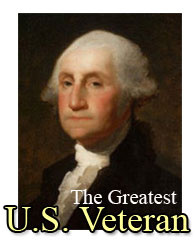 George Washington: America's Greatest U.S. Veteran
George Washington: America's Greatest U.S. Veteran
A Legend During His Own Time and So Much More 231 years later
There have been so many great veterans that have served our country. The list is so long that it would take 1000 days to write it all it down. But truly, and unarguably, there has never been and will never be no greater American Veteran than the Father of our Country.
George Washington (February 22, 1732 – December 14, 1799) was a central and critical figure in the founding of the United States, and is commonly referred to as father of the nation. He led America's Continental Army to victory over Britain in the American Revolutionary War (1775–1783), and in 1789 was elected the first President of the United States of America. He served two four-year terms from 1789 to 1797, winning reelection in 1792. His devotion to republicanism and civic virtue made him an exemplary figure among early American politicians.
In his youth, Washington worked as a surveyor of rural lands and acquired what would become invaluable knowledge of the terrain around his native state of Virginia which at the time included West Virginia and the upper Ohio Valley area around present day Pittsburgh. In the early 1750's Washington was sent as an ambassador to the French traders and Indians as far north as present day Erie, Pennsylvania. Virginia was very interested in this area as the gateway to western expansion via the Ohio River and onward. Pennsylvania and Virginia both competed for this area around what would become Pittsburgh, but the French saw it as even more valuable; a way to unite Quebec and Louisiana via river while pinning the English to the East Coast. Washington gained command experience during the resulting French and Indian War (1754–1763). First as a colonel under General Edward Braddock to take Fort Duquesne in Pittsburgh, then as a commander when at Braddocks Field, Braddock was fatally injured. It is curious to note that Washington suffered his only military defeat in the woods outside present day Pittsburgh at Fort Necessity, mistakes that he witnessed first hand at the brash leadership of European Braddock losing battles on a new "American" frontier. Due to this experience, his military bearing, his enormous charisma, his leadership of the patriot cause in Virginia, and his political base in the largest colony, the Second Continental Congress chose him, in 1775, as their commander-in-chief of the American army.
In 1776, he victoriously forced the British out of Boston, but, later that same year, was badly defeated, and nearly captured, when he lost New York City. However, in the bitter-cold dead of night, he revived the patriot cause, by crossing the Delaware River in New Jersey and defeating the surprised enemy units. As a result of his strategic oversight, Revolutionary forces captured the two main British combat armies, first at Saratoga in 1777 and then at Yorktown in 1781. He handled relations with the states and their militias, dealt with disputing generals and colonels, and worked with Congress to supply and recruit the Continental army. Negotiating with Congress, the colonial states, and French allies, he held together a tenuous army and a fragile, nascent nation amid the constant threats of disintegration and failure. He was also the country's first spymaster.[3]
Following the end of the war in 1783, Washington emulated the Roman general Cincinnatus, and retired to his plantation on Mount Vernon, an exemplar of the republican ideal of citizen leadership who rejected power. Alarmed in the late 1780s at the many weaknesses of the new nation under the Articles of Confederation, he presided over the Constitutional Convention that drafted the United States Constitution in 1787.
In 1789, Washington became President of the United States and established many of the customs and usages of the new government's executive department. He sought to create a great nation capable of surviving in a world torn asunder by war between Britain and France. His Proclamation of Neutrality of 1793 provided a basis for avoiding any involvement in foreign conflicts. He supported Treasury Secretary Alexander Hamilton's plans to build a strong central government by funding the national debt, implementing an effective tax system, and creating a national bank. When rebels in Pennsylvania defied Federal authority, he rode at the head of the army to authoritatively quell the Whiskey Rebellion. Washington avoided the temptation of war and began a decade of peace with Britain via the Jay Treaty in 1795; he used his immense prestige to get it ratified over intense opposition from the Jeffersonians. Although he never officially joined the Federalist Party, he supported its programs and was its inspirational leader. By refusing to pursue a third term, he made it the enduring norm that no U.S. President should seek more than two. Washington's Farewell Address was a primer on republican virtue and a stern warning against involvement in foreign wars.
As the symbol of republicanism in practice, Washington embodied American values and across the world was seen as the symbol of the new nation. Scholars perennially rank him among the three greatest U.S. Presidents. During Washington's funeral oration, Henry Lee said that of among all Americans, he was "first in war, first in peace, and first in the hearts of his countrymen."
ATTENTION READERS
We See The World From All Sides and Want YOU To Be Fully InformedIn fact, intentional disinformation is a disgraceful scourge in media today. So to assuage any possible errant incorrect information posted herein, we strongly encourage you to seek corroboration from other non-VT sources before forming an educated opinion.
About VT - Policies & Disclosures - Comment Policy




